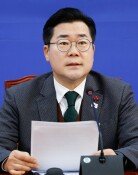S. Korea’s tax reforms raise concerns over economic sustainability
S. Korea’s tax reforms raise concerns over economic sustainability
Posted November. 07, 2024 08:26,
Updated November. 07, 2024 08:26
In September 2021, during the final year of the Lee Myung-bak administration, the Ministry of Strategy and Finance introduced a plan to “rationalize withholding tax,” intending to increase disposable income by lowering monthly income tax withholding through revised simplified tax tables. This measure was initially promoted by the ministry as a way to stimulate the economy without adding to sovereign debt. However, it was soon criticized as deceptive: while taxpayers would see less tax withheld each month, they would ultimately recover less in year-end adjustments. Despite the administration’s claim that this policy was the best option under difficult circumstances, the underlying, unspoken motive was clear—stimulating the economy just three months before the presidential election.
This maneuver created significant problems for the next administration. The Park Geun-hye administration, elected on a promise of “economic democratization,” quickly amended tax laws to generate additional funds. The Park administration shifted the labor income tax deduction from an exemption to a tax credit. Contrary to government claims that the policy would increase the tax burden for high earners, working- and middle-class families bore the brunt of the tax hike. Facing public outrage, the administration insisted that because tax rates hadn’t risen, this amendment wasn’t technically a tax increase—a claim that further alienated monthly income earners. Rather than candidly addressing the need for tax hikes or debt to fund welfare, the administration opted for a superficial strategy that quietly extracted more tax from working families’ paychecks.
Alarmingly, similar tactics continue today. Recently, the Ministry of Strategy and Finance announced plans to tap various public funds—including the foreign exchange equalization and housing deposit funds—to offset a 30 trillion won tax deficit. The Yoon Suk Yeol administration had initially earmarked this year’s budget for popular policies like increasing monthly pay for conscripted soldiers, raising the basic pension, and funding new airport projects. Yet, when tax revenue fell short, the administration drained these public funds, which were meant to stabilize the foreign currency market and support working-class housing, and even borrowed over 150 trillion won from the Bank of Korea.
This situation brings to mind the Moon Jae-in administration’s own controversial employment policies. In an effort to showcase higher employment figures, the administration allocated substantial tax funds to create hundreds of thousands of part-time jobs for the elderly and youth. While this boosted employment numbers, it also drove up low-wage, non-regular jobs, masking a decline in quality, sustainable jobs. Self-praise for maintaining “fiscal soundness” at the cost of public funds and an employment strategy that inflated numbers with low-quality jobs highlights an uncomfortable parallel.
The previous administration even faced allegations of accounting manipulation in its bid to meet contradictory goals of raising the minimum wage while increasing employment. Similarly, the current administration’s attempts to paint a rosier picture of public finances appear to be no accident. When governments become dogmatic about maintaining fiscal soundness and cutting taxes while still seeking popular support, officials are forced into dead-end choices. While fiscal soundness is a worthy goal, it should remain one of many guiding principles of national economic policy, not an untouchable ideal. High-ranking officials must first let go of this rigid thinking if sound financial policy is to be truly sustainable.
Headline News
- Former commander's notebook includes potential plan to incite N. Korean attacks
- Constitutional Court to proceed with impeachment trial on Friday
- Deputy PM confirms next year’s under 2 percent growth projection
- Ukraine says Russia uses fake IDs to hide N. Korean troops
- Pres. Yoon refuses impeachment documents for a week







